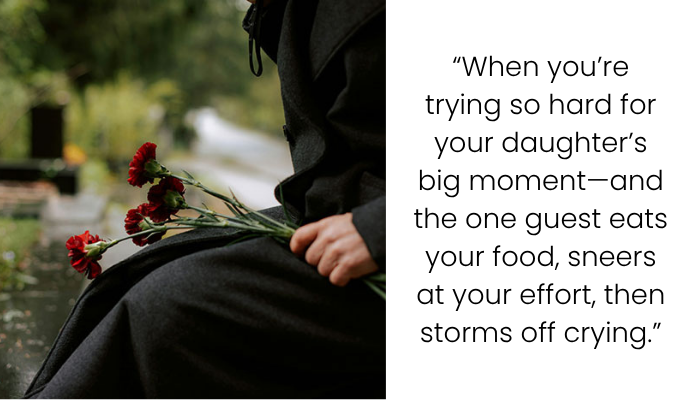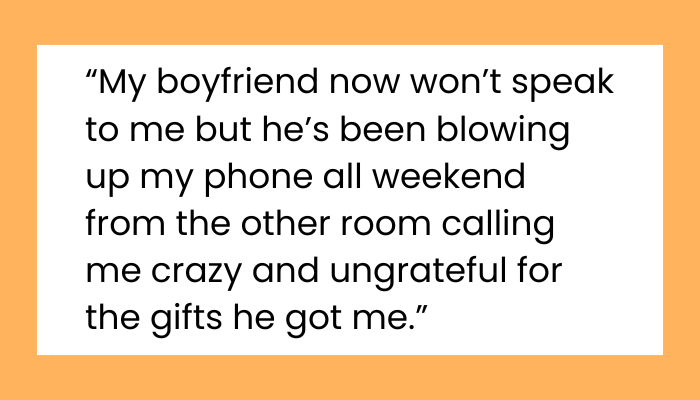AITA for refusing to apologise after my SIL was rude at my daughter’s birthday dinner?
You’re in a rough patch. You lost your wife this year, your job took a hit, and finances are tight. But you pulled something together for your daughter’s 13th birthday: spaghetti with her mum’s meat‑sauce recipe, a copy‑cat salad, homemade garlic bread, a small cake (even if the icing was “atrocious” by your own admission), and a few modest gifts. You invited your parents, your brother and his wife (SIL). You wanted a warm, small celebration for your daughter.
During the dinner and gift opening, your SIL made snarky, belittling comments that clearly annoyed your daughter. After the dinner when the rest of the guests left, SIL came into the kitchen and berated you for being cheap for your daughter’s birthday and said: “What would your wife think?” You lost your temper and fired back: yes you managed under difficult conditions, you ignored her snotty comments all night, and she showed up empty‑handed but ate your food and criticised. She cried, you told your brother she’s not welcome in your home again — if that means no relationship with him, so be it. Your dad sides with you; your brother says you should apologise to keep peace.
So you’re asking: AITA for refusing to apologise?
From passive-aggressive comments to outright snide remarks, even a simple celebration can quickly turn stressful when someone refuses to check their attitude at the door

The widowed author planned a small birthday dinner for his 13-year-old daughter, cooking her late mother’s favorite recipes and preparing homemade gifts and a cake












Let’s dig in. There are several layers here: grief and stress, financial pressures, birthday expectations, family dynamics, past history, and the question of whether an apology is warranted. I’ll walk through what the research says about apology, family conflict, and also the nuance of your situation.
1. Context matters — grief, finances, family history
Firstly: you’ve had a big loss (your wife) and financial instability. That’s going to make you emotionally raw and likely less able to tolerate slights. When someone belittles your effort for your daughter on her birthday, it hits deeper. You were trying to create something meaningful under constrained conditions.
Also: you note you’ve “never liked” your SIL, she “looks down at” your family and your late wife, so there’s a history of disrespect. That means this isn’t a neutral incident: you were primed for feeling hurt and defending yourself.
In family conflict research, prior relational patterns and power/dominance issues play a role. For example, one paper on family conflict dynamics notes that individual, relational and family‑level differences in perceptions of conflict matter a lot. Oda+1
2. What an apology is for and when it is meaningful
Apology is not just a “sorry you’re upset” line. The literature distinguishes between superficial apologies and ones that actually recognise harm. One piece finds that:
“Those who cannot look outside of themselves will apologise by saying ‘I am sorry you are upset with me’ rather than ‘I am sorry that I hurt you and you are in pain.’” Riverdale Mediation+1
So if someone apologises just to end the conflict but doesn’t recognise the harm or commit to change, it may be ineffective. Also, delaying apology, or giving one that doesn’t match the seriousness of the offense, often worsens the conflict. AustLII+1
From a dispute‑resolution view, a “full apology” correlates with better outcomes:
“Full apologies were seen as more sufficient apologies… they changed the injured party’s perceptions … improved physiological responses, decreased need to punish, and more likely forgiveness.” Colorado Lawyer+1
That suggests: apology isn’t always required, but it often helps for restoring or preserving a relationship.
3. But “should you apologise” isn’t a binary yes/no — it depends on which side of the ledger you’re on
In your case: you feel you did the effort, she did the belittling and came without even a gift. So from your perspective you weren’t the primary wrong‑doer; you were defending yourself and your daughter. That complicates the question of “should you apologise”.

Some relevant thoughts:
- If you said something you regret purely because you lost temper, apologising for the way you said it might defuse things, even if you stand by the substance of your complaint.
- But apologising for the substance (“I was wrong to call her out given what she did”) may feel inauthentic if you truly believe she was in the wrong.
- Research says that resolution requires seeing both sides, acknowledging harm done and being seen. If one party refuses accountability, reconciliation stalls. The Guardian+1
- Also, an apology doesn’t guarantee forgiveness; a non‑sincere or forced apology may make things worse. Colorado Lawyer+1
4. There is the bigger picture: your daughter and the birthday event
Your motivation was your daughter’s happiness. She seemed happy with the gifts your parents and you gave her. Your SIL’s behaviour upset her. So the moral weight probably leans toward protecting your daughter and standing up to disrespect. If you ignore the mistreatment, you might be signalling that it’s acceptable.
At the same time, by banning your SIL and possibly losing your brother’s engagement, there is a cost. If you manage to keep the daughter’s interest at heart, that might be okay, but if it also increases family estrangement and tension, the fallout could ripple.
5. Was your reaction proportional? Did you lose control? Could it have been handled differently?
You confess you “completely lost [your] temper”. That means even though you had justification, the manner matters. If you’d calmly addressed the issue or asked your SIL to step outside and talk privately, perhaps less damage. The fact you told her she’s not welcome and forced an ultimatum on your brother may escalate the conflict.
From conflict‑resolution research: the way we respond to aversive behaviour often dictates whether the conflict escalates. ResearchGate
6. So: Are you really refusing to apologise, or are you refusing to apologise for the wrong things
There’s a distinction:
- You could apologise for losing your temper / the harsh tone while still holding your view that her comments were out of line. That might preserve your dignity and open a door.
- But you may rightly refuse to apologise for calling her out or for asserting your boundary. That is legitimate if you believe the boundary was necessary.

7. What would I suggest based on research and your story
Short‑term: If you value your relationship with your brother and daughter and want less tension in the future, consider a partial apology: “I’m sorry I reacted the way I did / let my temper get the better of me” — without retracting your complaint about her behaviour. That would match research on “state apology” (for the manner) vs “moral apology” (for the act).
Long‑term: Reflect on whether you want ongoing engagement with your SIL and brother. If you want to salvage things, you’ll likely need some form of acknowledgement and boundary‑setting. If you’re okay with estrangement and believe protecting your daughter and yourself matters more, then standing your ground is defensible.
For your daughter: Explain to her why this happened (age‑appropriate) and model respectful conflict: “We set a standard for how we treat people in our home.” That creates clarity.
The author’s brother then demanded an apology which he wouldn’t give, and netizens agreed that he did nothing wrong and therefore shouldn’t apologize






Given what you described:
- You did a lot of work for your daughter under difficult conditions — that deserves respect.
- SIL’s behaviour was rude and undermined the event.
- Your reaction was angry and had potentially disproportionate elements (public scene, ultimatum).
So: I lean you are not the AH for refusing to apologise for her being rude or for setting a boundary. But you could have handled your reaction more smoothly and might be open to apologising for how you said it. If you refuse absolutely to apologise for any part of this, you risk burning bridges — which is your choice.
In short: you’re justified in your frustration and boundary‑setting; the only question is whether you want to keep the door open, and if so, an apology for the tone (not the substance) could work.







